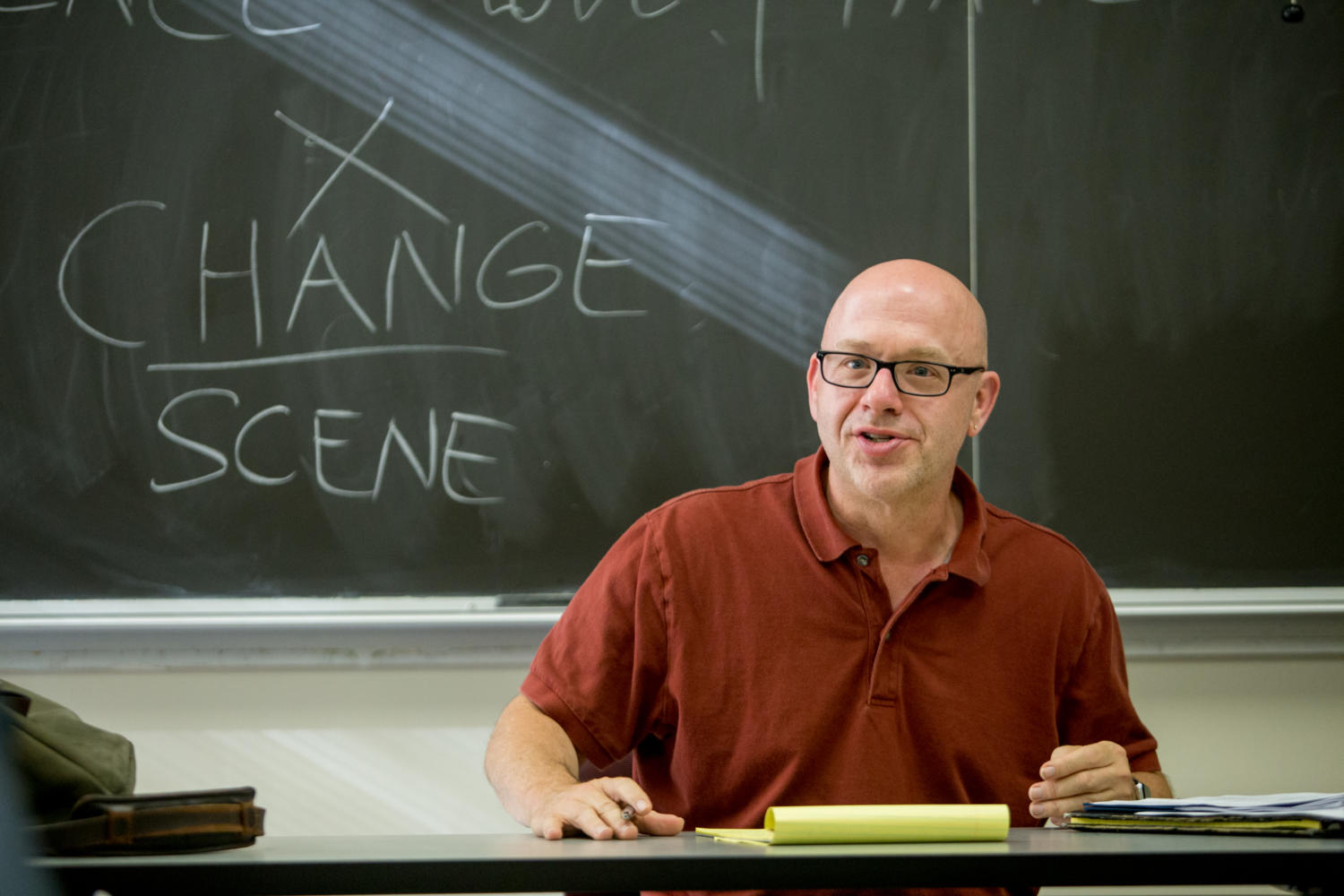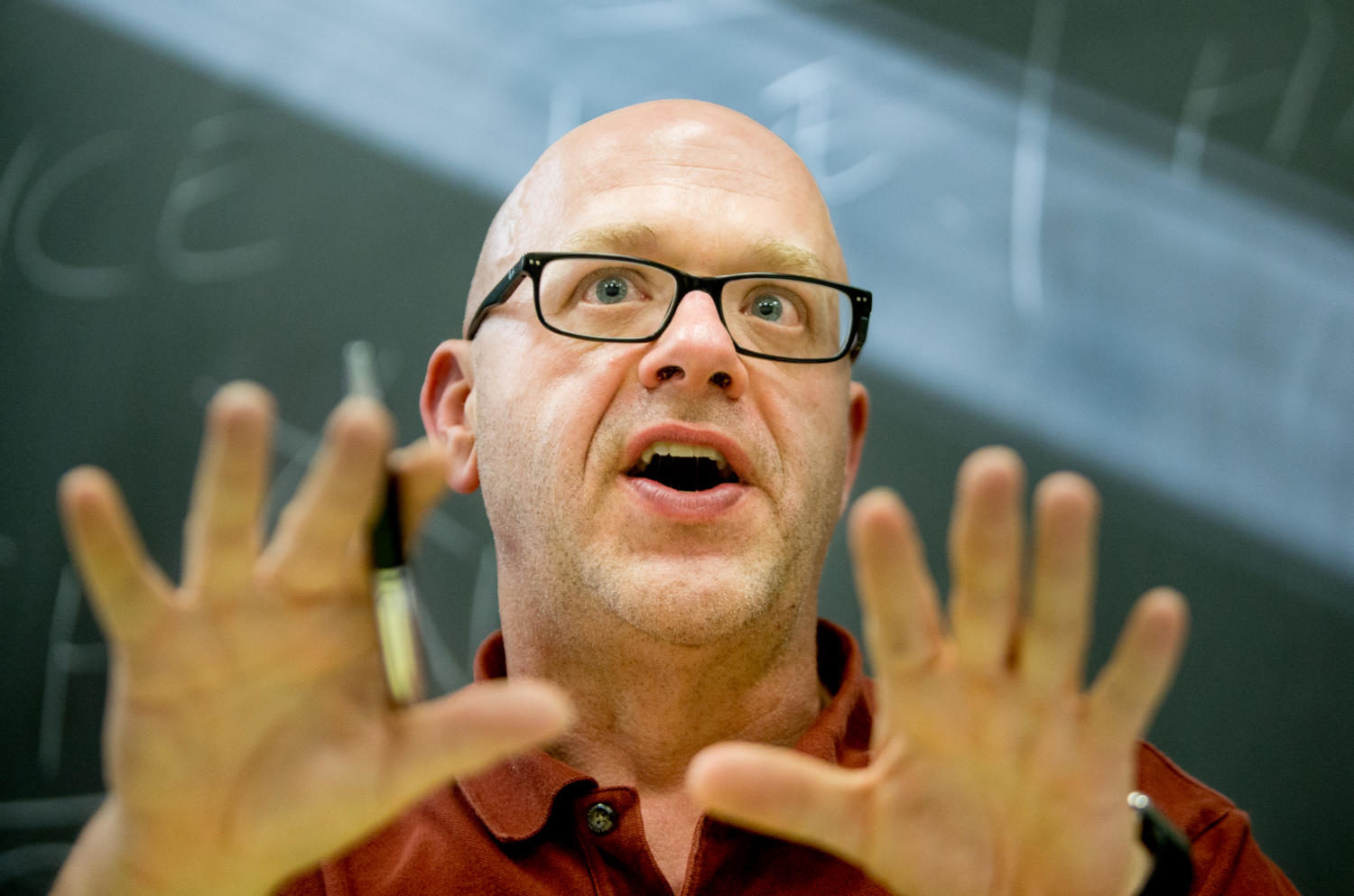From farm to fable: Pinckney Benedict’s journey from Appalachia to academia, authorship
English and creative writing professor Pinckney Benedict works with students during a beginning fiction class Tuesday, Sept. 19, 2017, at his classroom in Faner Hall. (Brian Muñoz | @BrianMMunoz)
September 21, 2017
Though he grew up on a dairy farm in West Virginia, Pinckney Benedict always knew the family business was not in his future.
“Everybody was delighted when I decided I was going to be a writer and an academic,” said Benedict, a professor in the English department. “I was a hellishly bad farmer.”
He said his interest in writing was sparked by something simple: when he was a kid, there just wasn’t much to do.
Advertisement
“When I was growing up in the 70s, we basically got two and a half channels of television,” Benedict said. “So all there was for me was reading and imagination. If we went to a movie three times a year, I’d be astonished.”
Still, Benedict said he was always left wanting more when he was through with a book.
“I’d read a book and I’d love it, but then the book was over,” Benedict said. “So I just sort of imagined what would happen next.”
Benedict said he eventually started coming up with new worlds inside his head and putting them down on paper.
His stories feature ordinary people in extraordinary circumstances, Benedict said.
So far he has written four books of fiction, three collections of short stories, a novel and the screenplay for the feature film “Four Days.” Benedict has also received numerous awards for his work, including a Literature Fellowship from the National Endowment for the Arts and the Chicago Tribune’s Nelson Algren Award.
One of his short stories, “Miracle Boy,” served as the basis for the critically-acclaimed short film of the same name.
Advertisement*
Award-winning author Joyce Carol Oates was another early influence on Benedict’s work. Oates served as a mentor and tutor for Benedict during his time as an undergraduate at Princeton College in 1986.
Though he said the training he received at Princeton was invaluable, the environment was something of a culture shock for the rural transplant.
“The people around me were people like Jeff Bezos, who is now one of the five richest men in the world, [Prince] Kyril of Saxe-Coburg, Brooke Shields was in the class just below mine,” Benedict said. “It was a star-studded world and I was not from a star-studded world.”
After he received his bachelor’s degree, his next stop was the Iowa Writers’ Workshop at the University of Iowa in 1988. It was during his second year in Iowa City that Benedict found himself in front of a class as a teaching writing fellow.

Though Benedict said he previously always saw himself as an author, not a teacher, he had a revelation in his new role.
“[Teaching] is a great thing to do in addition to my own writing,” he said. “Now, of course, teaching is the center of my professional life.”
In his 30 years as a professor, Benedict has taught students at Ohio State, Davidson University, Princeton and, for the past 11 years, SIU.
Throughout his teaching career, Benedict said he has developed a simple outlook on writing: there is no philosophy, only the truth.
“All I try to do is tell people the truth about their writing,” Benedict said.
His Beginning Fiction class is R-rated, he said. Benedict said he expects students to deal with mature themes because they’re adults.
“I know that our society treats people that come to college like they are children,” he said. “I don’t understand that … Everybody’s there by choice, nobody has to be there.”
Though Benedict doesn’t insert violence, sex and profanity into his lesson plans just for the sake of it, he said literature often naturally contains these themes.
“With any luck, that subject matter in the service of good art,” Benedict said. “It’s a grown-up class and we are going to deal with grown-up material and grown-up subject matter and grown-up themes.”
Benedict said students in his classes learn that the subject matter itself is of little importance — the goal is just to make good art. As a professor, Benedict said he tries to be as truthful as possible when looking over a student’s work.
“Leave your ego at the door, as much as that’s possible,” Benedict said.
The project consuming most of Benedict’s time outside of the classroom concerns the future of storytelling — virtual and augmented realities.
Benedict said this growing technology is a new medium for both writers and readers that can allow them to experience new things and environments from the comfort of their own homes.
“You can go to Tokyo or you can go to the Grand Canyon,” Benedict said. “For a writer, think of how useful that tool is. When I want to write about home, Greenbrier Valley, I can’t go there physically, but I’ll just go and be there virtually.”
The idea, Benedict said, is to use the technology to immerse the reader into the story.
“This is going to be where new literature is made,” he said. “This is going to be as big as film, this is going to be as big as gaming. This is how we are going to tell stories.”
Staff writer Joe McLaughlin can be reached at jmclaughlin@dailyegyptian.com or on Twitter at @jmcl_de.
To stay up to date with all your southern Illinois news, follow the Daily Egyptian on Facebook and Twitter.
Advertisement









